
October 2023 contents
— The Rustic Bridge remade in stone (largely by unemployed ex-servicemen), 1920 . . . [click on three dots to go straight there]
— Improper conduct, 1900 . . .
— English and American Teeth from Wandsworth Common, 1906 . . .
— Prince of Wales's homecoming eagerly awaited at Battersea, 1920 . . .
— Baskerville Cricket Club play in the foggy gloom, 1953 . . .
— On reaching Wandsworth Common, "the fourth eleven had rather an unfortunate experience", 1909 . . .
— Bellevue butcher's horse worked when in pain, 1919 . . .
— "Iniquitous" Tar-paving, 1909 . . .
— A "refreshment kiosk" to be erected in Battersea Cemetery, 1898 . . .
— "People are dying to move here! Incredible four-bedroom home with a spooky twist", 2021 . . .
— A "mob of some four hundred persons awaited the arrival of the funeral cortege at Battersea Cemetery with the avowed intention of wreaking vengeance . . . ", 1877 . . .
— Calls for a new mortuary to replace the "horrors of the present place", 1916 . . .
— Battersea demands the right to deposit road sweepings on the Common, "as hitherto", 1887 . . .
— Black Sea is being filled with refuse, 1869 . . .
— Typhoid and other diseases in the girls' and boys' asylums caused by sewage, 1874 . . .
— Pick of Past October Chronicles . . .
The Rustic Bridge remade in stone, 1920
Rustic bridges were once all the rage in urban commons and parks around 1900. Here's Battersea Park's, with a fountain:
And here's ours:
Popular as wooden-branch bridges were — they did such a good job of evoking quaint rurality — they were rickety, prone to rot, and required a lot of maintenance. In the 1920s there was another reason for replacing it with a more massive and permanent structure — the need to find useful work for the demobbed servicemen.
But not everyone agreed this sort of public work was a good idea (as in the following article), but all agreed something had to be done if the unemployed were not to "rust" and become prey to "agitators".
Here's a short extract (I have emboldened the reference to the bridge.)
A crowd of several hundred workless men in the neighbourhood of the Battersea Labour Exchange yesterday was a cheerless sight, particularly as most of the men were ex-soldiers. The fact of their being without work is not the worst characteristic. It is that enforced idleness impairs the capacity for effort.
We all know the rusty metals are worthless, or nearly so. Men rust in a similar manner, and when thoroughly rusted are equally useless. Our unemployed are rapidly rusting: that was evident from the appearance of many of those who composed yesterday's crowd.
The remedy is work, not doles. Agitators recognise that, but their ideas with regard to work are crude; they do not trouble to envisage work in relation to its results.
While a man is doing something and he's regularly paid wages, the agitator is satisfied.
Work may be useless, or unnecessary like the building of a bridge over the lake at Wandsworth Common, which is being undertaken because the County Council happen to have a little spare cash.
The editorialist continued:
Unemployment cannot be removed except by productive and economically remunerative operations. Endeavours in other directions [such as the building of the Common's new bridge] are expedients which may be palliative, but generally are nothing but camouflaged pauperisation.
"The woman, it was said, was in the habit of prowling about the common, and going into the workhouse at intervals for a clean up."
IMPROPER CONDUCT
Mr. Garrett was informed by Inspector Jones that special constables have been placed on Wandsworth Common in order to protect respectable people.
As a result of extra police vigilance Thomas Charles Bixby, whose address it appeared at first had been given as No. 15 Tonsley Hill, and then 13 Ebner-street, and Matilda Elder, no home, were arrested. The woman, it was said, was in the habit of prowling about the common, and going into the workhouse at intervals for a clean up.
The conduct of both prisoners was disgraceful. They were each fined 20s or 14 days. Bixby on Saturday "begged and prayed" PC 39 VR to let him go.
[BNA: Link]
High class English and American teeth from Wandsworth Common.
Mr ERNEST DAVIS 110 TRINITY ROAD
WANDSWORTH COMMON
ATTENDS AT 90 HIGH STREET
Every Wednesday from 9 am to 7 pm
HIGH-CLASS
ENGLISH & AMERICAN ARTIFICIAL TEETH
Complete Set £1 1s
Single Tooth 2s 6d
Extractions 1s
REDUCED FEES TO SERVANTS FOR ONE MONTH

I wonder how "American" teeth were different from "English" ones?
And what do you think "reduced fees to servants" means? Why servants?
"The arrival of the Prince of Wales was eagerly awaited at Battersea on Monday. The Royal train . . . was keenly watched for from Wandsworth Common and from the bridges near Clapham Junction."
"[P]upils of Emanuel School . . . apparently sat in perfect comfort on the spikes and knife-edge glass which adorn the top of the parapet of the "Freemasons" Railway Bridge at Battersea Rise . . .
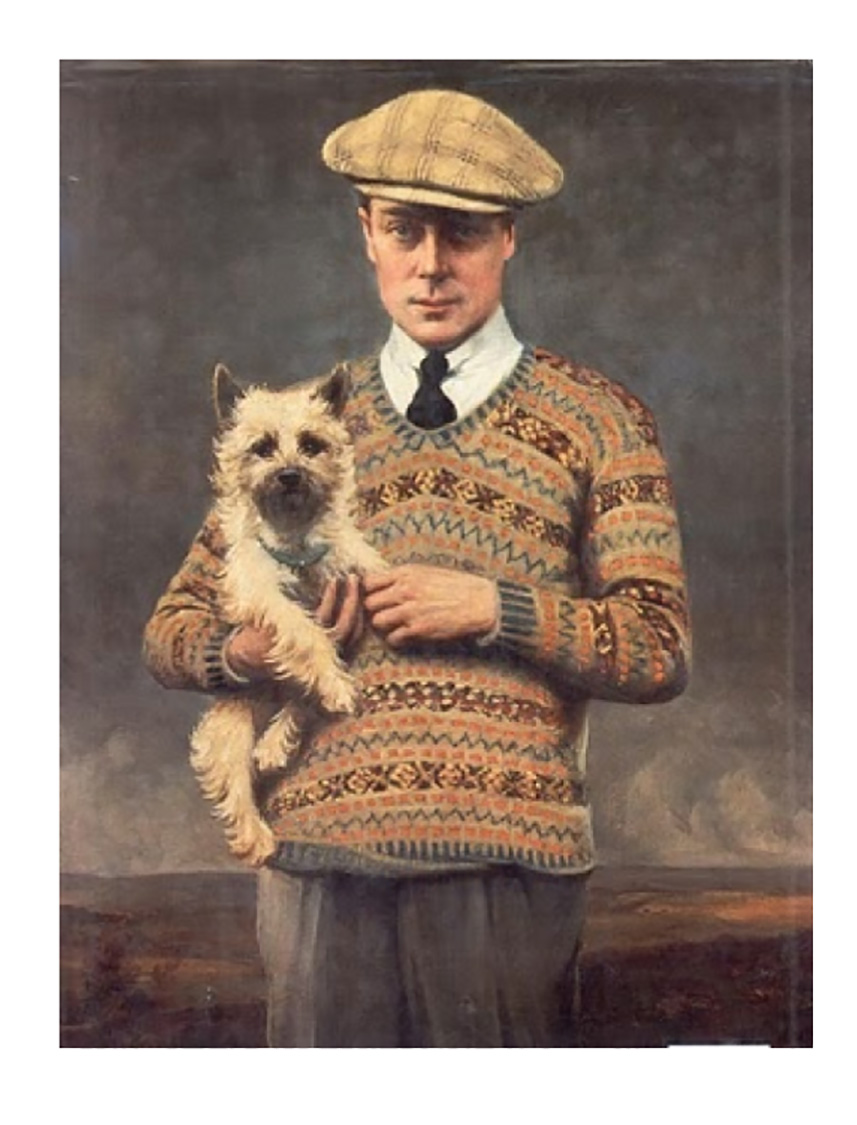
It's a little hard to imagine the future Edward VIII as a "style icon", whose taste for casual clothing (particularly bold Fair Isle-patterned pullovers) made him so popular with young people, but it seems he was.
See e.g. Mediakron.bc.edu: Fashion and Decor: A Cultural History: Prince of Wales — the site as a whole is great fun.]
THE PRINCE'S HOME COMING.
BATTERSEA SCHOOL GUARD OF HONOUR.
The arrival of the Prince of Wales was eagerly awaited at Battersea on Monday. The Royal train, timed to reach Victoria at 12.40, was keenly watched for from Wandsworth Common and from the bridges near Clapham Junction.
Hundreds of young people pressed themselves against the railings by the side of the line. Progressive cheering started as soon as the most distant watchers caught sight of the smoke of the engine.
None of the boys were more loyally enthusiastic than pupils of Emanuel School, who apparently sat in perfect comfort on the spikes and knife-edge glass which adorn the top of the parapet of the "Freemasons" Railway Bridge at Battersea Rise . . .
[BNA: Link]
[The description of the crowds lining the railways and bridges reminded me of the adulation shown given to Giuseppe Garibaldi, hero of Italian Unification received in 1864.]
[At this time, Battersea Grammar School was located on St John's Hill, on the site of the Granada Cinema (built 1937, now repurposed as a church, and renamed "Transformation House" ).
See e.g Granada Cinema. The school moved to a site on the edge of Tooting Bec Common in ??? (now ?)
Cinema Treasures
Stories-of-Londonon.org: https://stories-of-london.org/granada-clapham/
"Baskerville Cricket Club: Wandsworth played The Rest in the foggy gloom — Wandsworth managed to win by two wickets before the rain arrived.
Cricket win in foggy gloom
Baskerville Cricket Club ended their season with an inter-club match. Wandsworth Borough Members versus The Rest.
Despite the terrible weather, the match was played to a finish. After The Rest had been dismissed for 129, Wandsworth batted in the foggy gloom and managed to win by two wickets before the rain arrived.
Details: The Rest. — Stallion c b Short 43; Schwarz run out 11; Sayers c b Hedgecock 22; Bone b Hedgecock 13; Mullett b Hedgecock 3; Baker c b Hedgecock 13; Barker run out 0; Sayers b Matthews 0; Mullett not out 15; Styles b Start 4; extras 5. Total 129 (Hedgecock 4 I don't think that's true—21).
Wandsworth. — Burrage b Bone 15; Sankey c b Bone 13; Matthews h Baker 20; Bennett c b Bone 6; Start b Baker 16; Howe run out 20; Short c b Sayers 10; Polley not out 14; Gibson not out 5; extras 11. Total 130—7 (Bone 3—30). Hedgecock did not bat.
[BNA: Link]
Cathy's father, "Jock" Short, with her mother Daphne's brother Alan, founded the Baskerville Cricket Club club in 1945. The Short family lived on Nicosia Road, which connects to Baskerville Road. The birth of several children "in no way changed the notoriety of his home which was and still is the house where you talk cricket, you drink cricket and you sleep cricket."
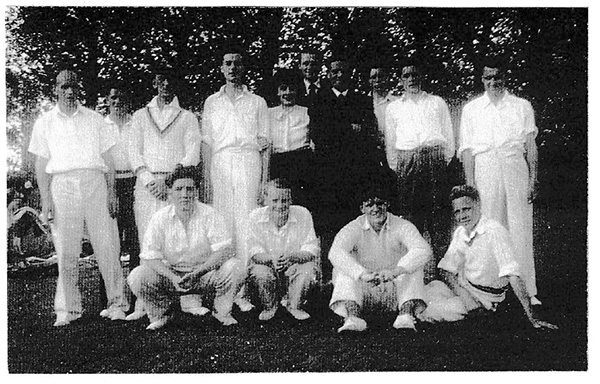
And now for a story about football:
On reaching Wandsworth Common, "the fourth eleven had rather an unfortunate experience . . . "
The fourth eleven had rather an unfortunate experience. On reaching Wandsworth Common, to play Crayton, they found that the pitch was on a piece of hilly ground, quite devoid of any grass. The players were further hampered by the presence of a garden seat, several trees, and a pond.
In the first few minutes of the game, Tims, at outside left, in endeavouring to scale one of the numerous hillocks which adorned the ground, fell and severely injured, his knee.
He was conveyed to Bolingbroke Hospital, and will not take the field again this season.
Crayton won the match by 4 goals to 3.
[BNA: Link]
Sidney Rough, butcher of Bellevue Road, in court for "working a horse in an unfit state," 1919.
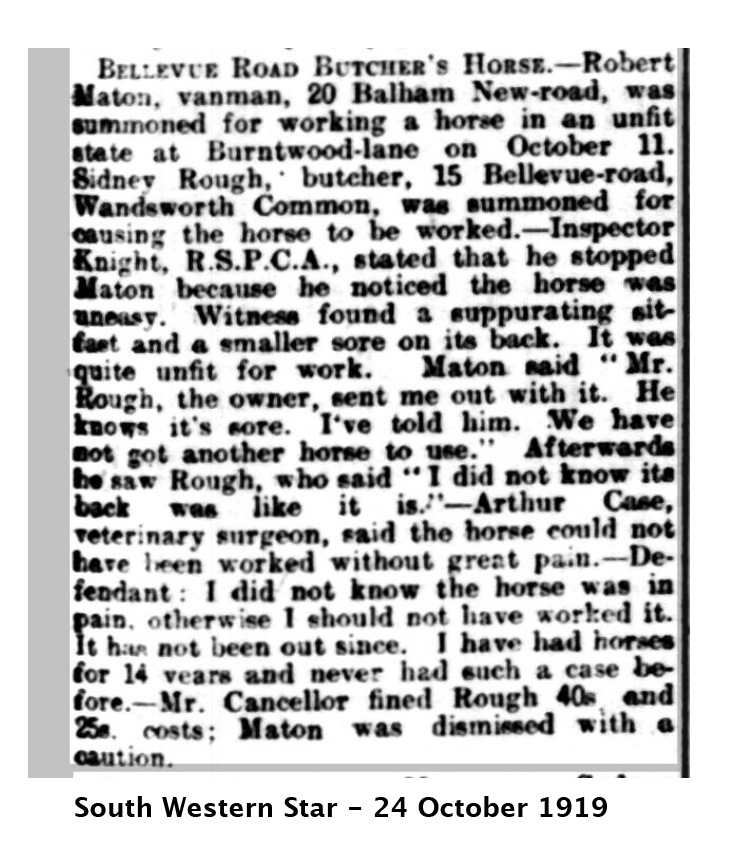
BELLEVUE ROAD BUTCHER'S HORSE
Robert Maton, vanman, 20 Balham New-road, was summoned for working a horse in an unfit state at Burntwood-lane on October 11.
Sidney Rough, butcher, 15 Bellevue-road, Wandsworth Common, was summoned for causing the horse to be worked.
Inspector Knight, R.S.P.C.A., stated that he stopped Maton because he noticed the horse was uneasy. Witness found a suppurating sit-fast * and a smaller sore on its back. It was quite unfit for work.
Mason said "Mr. Rough, the owner, sent me out with it. He knows it's sore. I've told him. We have not got another horse to use. Afterwards he saw Rough, who said "I did not know its beck like it is."
Arthur Case, veterinary surgeon, said the horse could not have been worked without great pain.
Defendant: "I did not know the horse was in pain, otherwise I should not worked it. It has not been out since. I have had horses for 14 years and never had such a case before."
Mr. Canceller tined Rough 40s and costs; Maton was dismissed with a caution.
[BNA: Link]
[* "sit-fast" = a hardened area of skin with inflamed edges, caused by repeated friction, on the back of a horse under the saddle].
"Iniquitous" proposal to spend £35 on tar-paving a path on the Common — the Borough Council versus the County Council.
AN "INIQUITOUS" PROPOSAL
A proposal to spend £35 on tar-paving a footpath on Wandsworth Common near Wandsworth Common Station, objected to by Mr. Phillip, who pointed out that the Borough Council paid heavy sums to the County Council and might not to do that body's work as well. He mentioned that in a similar matter the London County Council had turned its back on Balham.
Mr. Lidiard said the matter required a good deal of consideration. If the Borough Council started this kind if thing where was it going to stop.
Mr. Wise said the path in its present condition was a disgrace. He urged the Council to carry out the work.
Mr. Turnbull followed with the declaration that the declaration that the proposal was iniquitous. The Borough Council ought not to make good the negligence of the County Council.
Mr. Wise read a document which showed that the Borough Council had agreed to maintain the path.
The Council referred the matter back to the committee.
[BNA: Link]
A "refreshment kiosk", to be erected in Battersea Cemetery, excites national (and indeed international) interest. Punch magazine even ran a rather ghoulish poem.
BATTERSEA VESTRY has again found itself famous.
Some of the French journals have noticed and approved the decision to erect a refreshment kiosk in Battersea Cemetery. Monsieur considers that this is another proof of John Bull's "practical spirit."
Punch, too, alludes to this cemetery kiosk in the following lines:
Spirits, of course, will be there.
And bier would not out of place;
But yet, methinks, I would not care
To eat where death had left its trace.
The heart would be with oppressed with gloom
To think that lots to live had ceased.
And a reminder'd be each tomb
Of "the skeleton at the feast."
[BNA: Link]
"An incredible four-bedroom home in south west London is on sale for £1.4 million, but it comes with a spooky twist — it sits on the site of a graveyard."
"A mob of some four hundred persons awaited the arrival of the funeral cortege at Battersea Cemetery with the avowed intention of wreaking vengeance . . . "
The inhabitants of Battersea aired their virtuous indignation in a somewhat startling way on Monday afternoon, the occasion being the funeral of a lady lately living in Austin-road, Battersea, and whose husband, a greengrocer and coal dealer, had deserted her for "another fair" some time previously.
A mob of some four hundred persons awaited the arrival of the funeral cortege at Battersea Cemetery with the avowed intention of wreaking vengeance on the living lady who had wronged the dead one.
As it happened, only the husband followed his wife to the grave, and the mob vented their wrath in trampling down the flowers and shrubs, breaking the trees, and damaging the railings and tombs in the cemetery.
Just, however, as they were about to disperse in disappointment, their intended victim was descried walking calmly across the common towards the cemetery.
A shout was raised, the unfortunate woman was assailed with sticks, stones, mud, umbrellas, and even by feminine finger nails till she was fain, in a pitiable plight, to take refuge in a photographer's studio at the corner of the Common.
Here she stayed, with a crowd howling at her from the outside, till a police-sergeant and seven stalwart constables were sent for, who escorted her to Clapham Junction railway station, and sent her away by train to get her wounds and bruises attended to.
This is a splendid sample of English fair play, and one can very well understand the spirit that hounded unfortunate women to death a century or so ago just because they happened to be old and ugly.
[BNA: Link.]
[This must have been Henry Morris's studio. Address?]
"The horrors of the present place are pictured by a reader whose sister was killed at Wandsworth Common in the great storm of June, 1914. The brother and mother of the poor young lady blind her "laid out in a disreputable building like a pigsty, or even like a slaughter-house, with garments untidily done up in a bundle and thrown in a corner." No wonder an eminent doctor speaks of it as a 'desecration of the dead.'"
That Mortuary.
The Mayor of Wandsworth courteously acknowledges the "Candid Communication" we addressed to him on the subject of the local Mortuary, and, candid in his turn, admits the building is undoubtedly a great scandal, and hopes that our revelations will impress public opinion. That is our hope also, and that was our object in opening up the matter. We think there is a possibility of success, for Wandsworth citizens are now circulating a Petition calling for a Town's Meeting, to induce the Board of Trade to sanction a loan for a new building.
The horrors of the present place are pictured by a reader whose sister was killed at Wandsworth Common in the great storm of June, 1914. The brother and mother of the poor young lady blind her "laid out in a disreputable building like a pigsty, or even like a slaughter-house, with garments untidily done up in a bundle and thrown in a corner." No wonder an eminent doctor speaks of it as a "desecration of the dead."
[BNA: Link]
For the sake of completeness, here is the earlier "communication" from John Bull:
For an account of the 1914 great storm, and the deaths that were caused, see Sunday, 14 June 1914: "Thunderstorm on Wandsworth Common kills seven. Four of the dead are small children."]
Battersea demands the right to deposit road sweepings on the Common, "as hitherto", 1887.
WANDSWORTH COMMON. It was agreed that the View Committee of the Battersea Local Committee be appointed a deputation to wait upon the Parks and Open Spaces Committee of the Metropolitan Board of Works, to urge upon them the desirability of allowing the board to deposit road sweepings on a portion of Wandsworth Common, as hitherto.
[BNA: Link]
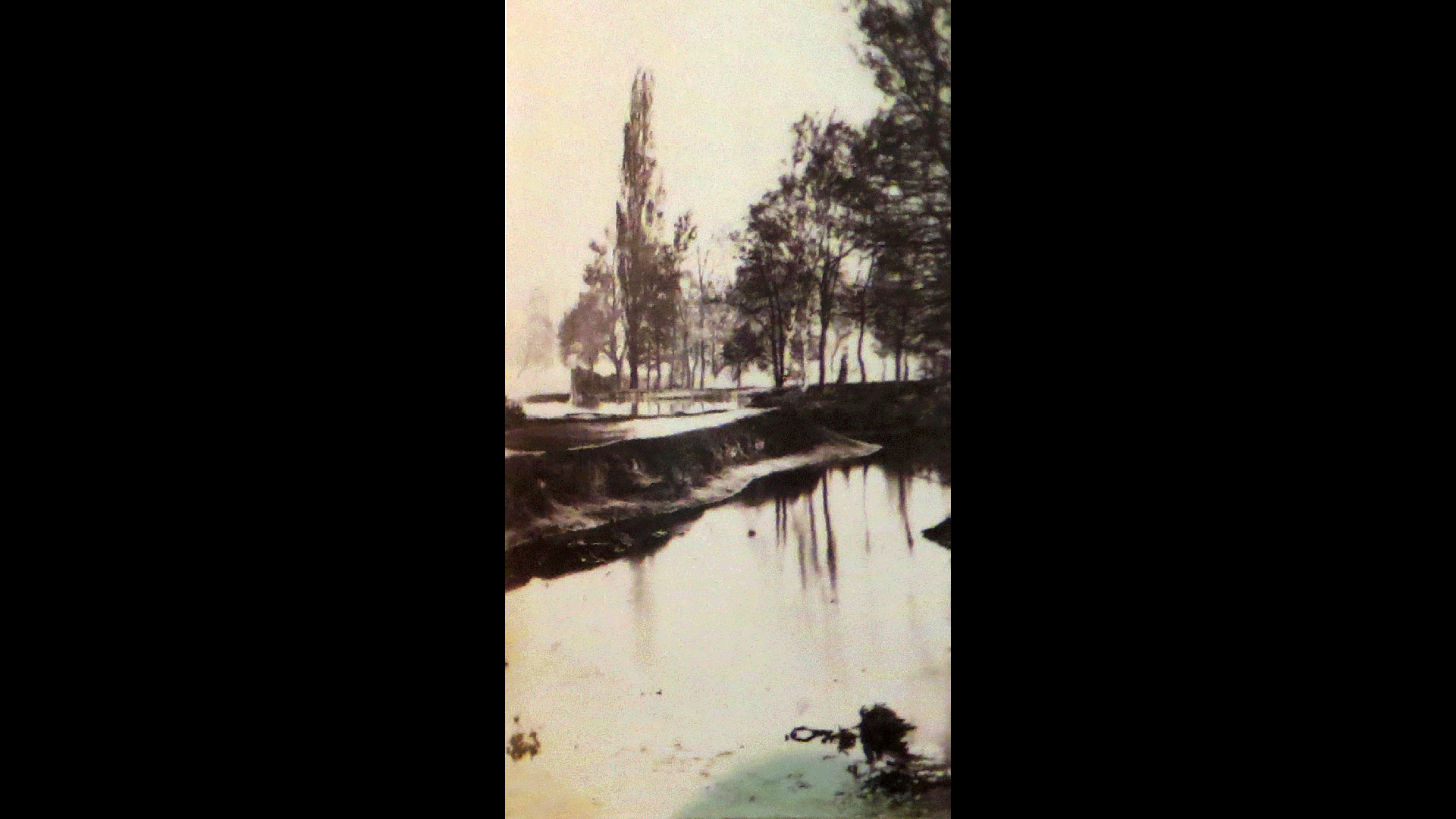
BLACK SEA
The chairman called attention to the filthy and unhealthy condition of the Black Sea. The water had been drawn off, and it was filled up with similar refuse to that which was placed in the holes in Wandsworth Common. It was agreed to draw the attention of the Wandsworth Board of Works to the subject. The vestry then adjourned.
[BNA: Link]

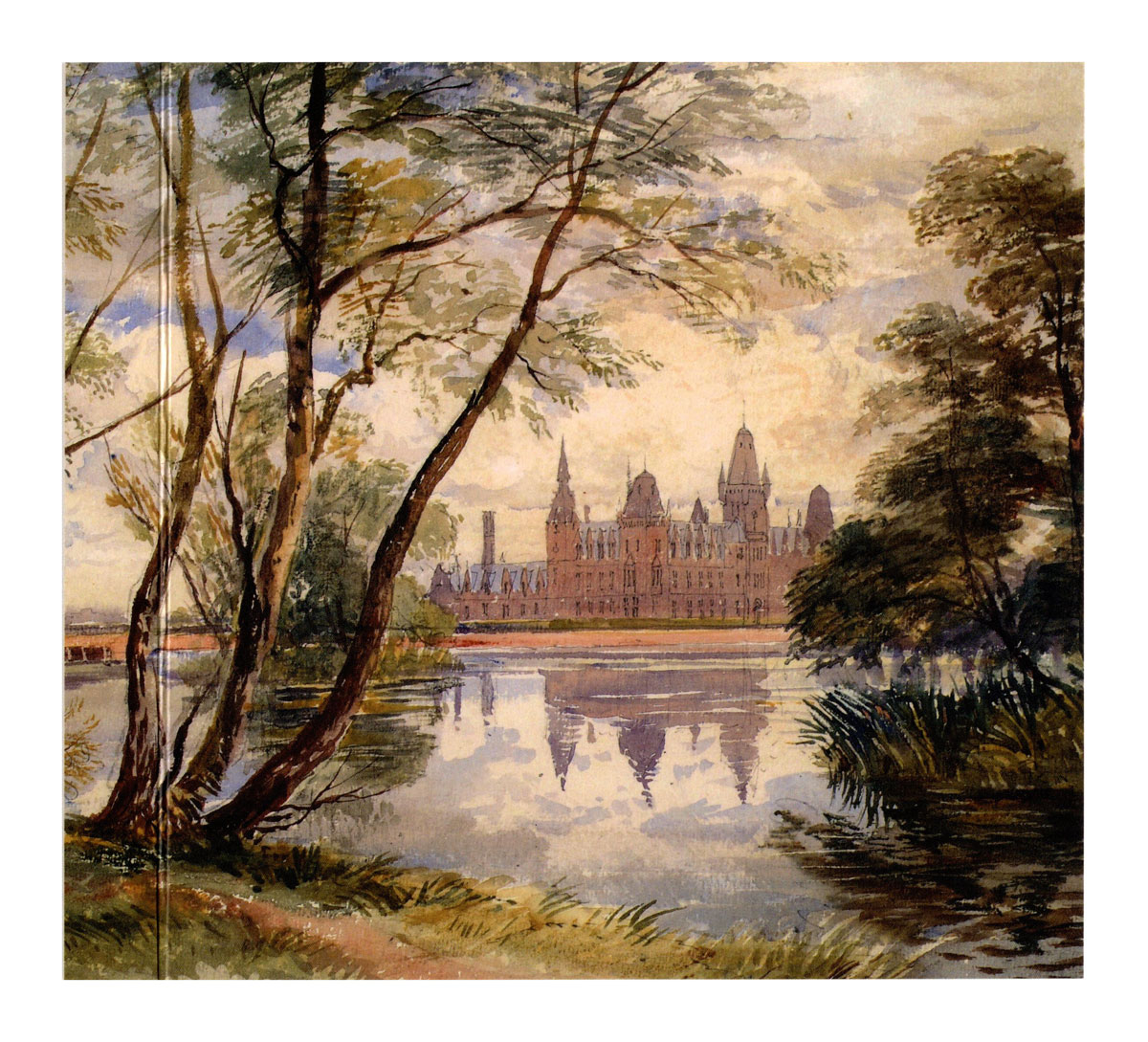
The high death rate from typhoid and similar diseases among girls at the RVPA put down to the "dangerous and unsuccessful method" of treating the asylum's sewage — essentially spreading excrement on the surrounding ground.
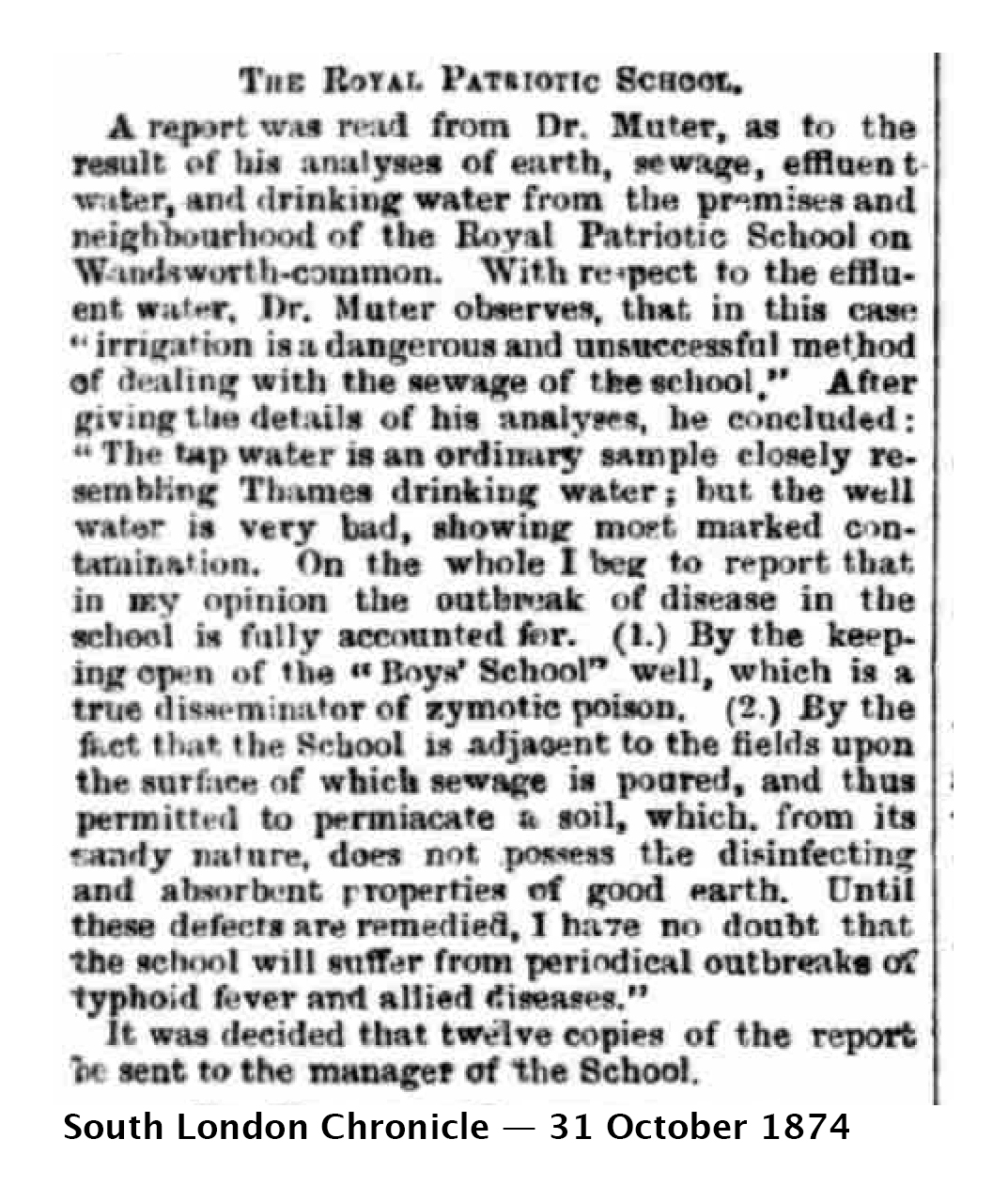
The Royal Patriotic School.
A report was read from Dr. Muter, to the result of his analyses of earth, sewage, effluent water, and drinking water from the premises and neighbourhood of the Royal Patriotic School on Wandsworth-common.
With respect to the effluent water. Dr. Muter observes, that in this case "irrigation is a dangerous and unsuccessful method of dealing with the sewage of the school."
After giving the details of his analyses, he concluded: "The tap water an ordinary sample closely resembling Thames drinking water; but the well water is very bad, showing most marked contamination.
On the whole I beg to report that, in my opinion the outbreak of disease in the school fully accounted for.
(1) By the keeping open of the "Boys' School" well, which is a true disseminator of zymotic poison.
(2) By the that the School to the fields upon the surface of which sewage is poured, and thus permitted to permiacate [?] a soil, which, from its sandy nature, does not possess the disinfecting and absorbent properties of good earth.
Until these defects are remedied, I have no doubt that the school will suffer from periodical outbreaks of typhoid fever and allied diseases."
[BNA: Link.]
Permiacate? I have not found a definition. Is this simply our word "permeate"? It is interesting to note that the local geology of the Common on which the RVPA is built - gravel and sand - is failing to cleanse the sewage, which infects the boys' school well. From ?, this became Emanuel School.
[* "Zymotic disease — a 19th-century medical term for acute infectious diseases, especially "chief fevers and contagious diseases (e.g. typhus and typhoid fevers, smallpox, scarlet fever, measles, erysipelas, cholera, whooping-cough, diphtheria, etc.). See e.g. Wikipedia: Zymotic disease]
— "Volunteer Sham Fight", 1807 . . . [click on three dots to go straight there]
—"American Water-Weed" invades the Black Sea, 1863 . . .
— "Memorial" petition sent to Metropolitan Board of Works to take corral of Common away from Earl Spencer, 1867 . . .
— George Bickerdike calls for donations to support John Buckmaster's court costs, 1870 . . .
— Calls for gravel digging to stop, 1869 . . .
— "Coronation" of a new Mayor of Garratt, 1804 . . .
— John Hobbs runs away with the gypsies, 1866 . . .
— Pedestrian races, 1847 . . .
— A deputation of local "great and good granted an audience with Earl Spencer, 1863 . . .
— Death of John Breeze, who fought in the Charge of the Light Brigade, 1889 . . .
— Polytechnic Bazaar at Bramblebury, 1889 . . .
—"The Great Storm", 1987 . . .
— Suffrage campaigner Emily Duval to speak on Wandsworth Common, 1908 . . .
— Gravel digger buried alive, 1866 . . .
— Rugby: Bath v Harlequins on "Wandsworth Common", 1907 . . .
— Thomas Hardy falls seriously ill, 1880 . . .
— In praise of Wandsworth Common, no thanks to the Neal Family, 1886 . . .
— MCC to play Wandsworth home and away, 1828 . . .
— Birth of John Poyntz Spencer, future 5th Earl . . .
— Spot the barrage balloon, 1941 . . . [click on three dots to go straight there]
— Starving boy runs away with the gypsies, 1866 . . .
— Pedestrianiam and running races — a suspicion of match fixing, 1847 . . .
— Malicious damage of trees, 1897 . . .
— Signals between the Common and Belleville School, 1941 . . .
— Mysterious assault upon a Gentleman, 1866 — was it the one-armed Watchman? . . .
— The great British Pet Massacre, 1939 . . .
— Scavengers wanted to deal with "SCRAPINGS of the roads, and for collecting and removing all DUST, dirt, ashes, rubbish, ice, snow, and filth, in the parishes of Battersea, Clapham, Putney, and Wandsworth", 1856 . . .
— Bolingbroke Grove / Chatham Road change names, 1866 . . .
— Please can we dump our street sweepings on the Common again? 1887 . . .
— Mr Bonham's Prize-winning potato, 1887 . . .
— UFOs over West Side, 2008 . . .
— The Charge of the Light Brigade, 1854 . . .
SO many more stories still to tell. But that's all for now, folks.
If you would like to receive occasional notifications of new Chronicles, let me know.
There's a SEARCH box at the top of this page, and here:
Send me an email if you enjoyed this post, or want to comment on something you've seen or read on the site, or would like to know more —or just want to be kept in touch.
New videos from The Friends of Wandsworth Common
"COMMON MEMORIES: Life on & around Wandsworth Common, 1930s-1980s"
COMMON MEMORIES — Life on & around Wandsworth Common, 1930s—1980s
6/2023 — Over the past year, members of the Friends of Wandsworth Common Heritage group, led by Ros Page, have interviewed lifelong residents of the Common to explore their life and experiences and how the Common used to be.
The interviews were all filmed by John Crossland and the more than 20 hours of footage beautifully and sensitively edited down into this 'charming and engaging' film by Rosa Navas, a local film maker and Friend.
The film is interspersed with old images and film clips, bringing alive the narrative of the interviewees. The result is a fascinating insight into how life on Wandsworth Common has changed over five decades.
With special thanks to the production team led by Ros Page, including Stephen Midlane, Henrietta Gentilli, Louise Murphy, John Turner, cameraman John Crossland and editor Rosa Navas.
The film was launched on 6 June 2023 in the Fiennes Theatre, Emanuel School, and special thanks are due to Lisa Irwin and the school for their very generous support.
The video is now available to view via the Friends of Wandsworth Common website or on YouTube .
A DVD is also available, at £5.
Incidentally, a couple of years ago I made a short video (my first) from Edwardian postcards and photographs of the lake, set to music by Claude Debussy, which you can view here. Utterly self-indulgent.
And here's one on the Three-Island Pond:
Back to the top of this page . . .
SO many more stories still to tell. But that's all for now, folks.
If you would like to receive occasional notifications of new Chronicles, let me know.
This search box is not very consistent, but always worth a try:
Send me an email if you enjoyed this post, or want to comment on something you've seen or read on the site, or would like to know more —or just want to be kept in touch.
October 2023
Return to the top of this page . . .